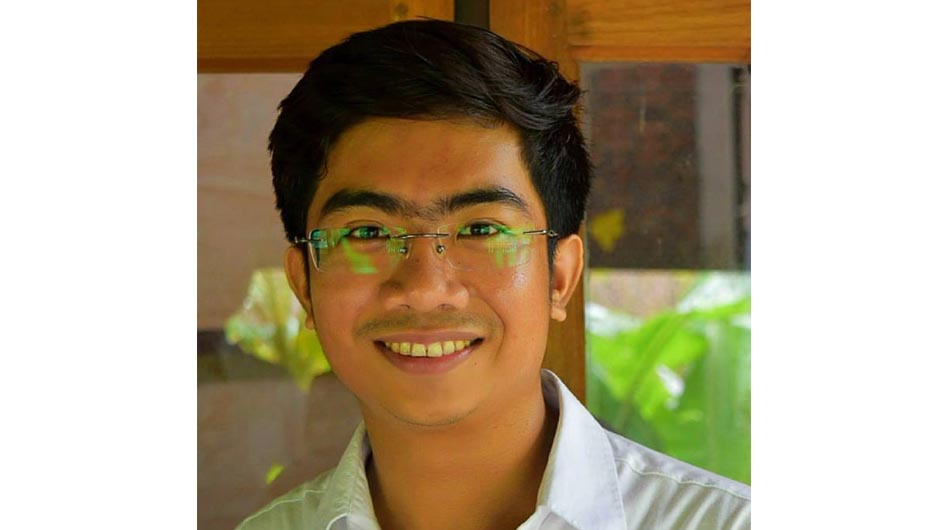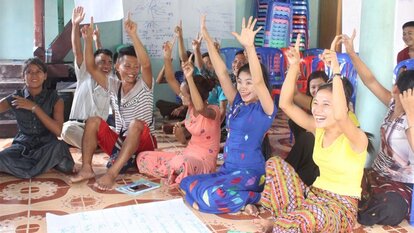Interview with Pyae Sone, a sernior trainer with the Scholar Institute

Public participation is indispensable in a nascent democracy. To participate effectively, people need to be well-informed about democratic values and practices. Accordingly, the Scholar Institute, Hornbill Organization, Naushawng Development Institute and Myanmar Egress jointly organize civic education training sessions called “Public Participation for Democracy” in remote areas of Kachin, Kayin, Chin, Mon, Rakhine, Ayeyawaddy, Magway and Sagaing through the STEP Democracy Project supported by the European Union.
Pyae Sone is a senior trainer from Scholar Institute. Through supervising more than 50 voter and civic education trainings, he has engaged in dialogue with diverse communities in remote areas of Rakhine State and Magway Region. Below is an interview of Pyae Sone on his experience organizing these sessions and their impact on these communities.

What do you enjoy most about working as a trainer?
I love sharing knowledge and information using a variety of teaching methods. Through engaging in dialogue with participants, I am exposed to different perspectives. It is a reciprocal learning process, which I enjoy a lot.
Why are sessions like the “Public Participation for Democracy” important at the moment?
These sessions are important in Myanmar’s democratic transition because people are the essence of democracy. If people understand democratic culture and values, and apply them in their daily lives, the transition will be faster and stronger. Moreover, they will be able to provide checks and balances to the presiding government and contribute to the transition. Inclusive participation will encourage faster progress in every aspect of the democratic transition. Therefore, in a nascent democracy, it is very important to inform people about democratic practices and active civic participation.
How have participants’ perspectives changed through these trainings?
A common understanding of democracy I have encountered across trainings is that in a democratic system, individuals can do, and say, whatever they want, without caring about anyone else. Also, people have considerable expectations for the democratic process. They think their lives will change overnight. For example, some participants think that the education system can be changed within 30 days. These expectations and flawed understanding of democracy can pose as challenges to the transition process.
In sessions, we discuss the meaning of democracy, its practices, and culture. By doing so, we correct the flawed perception participants have of democracy, and also help them have more realistic expectations for societal change. They learn to respect different opinions and how to effectively compromise, starting from within their own families. Democratic practices start at the family level.
What are the main challenges in holding sessions in remote areas?
We face a lot of challenges; I won’t focus on logistic challenges. The challenge I want to focus on is the low levels of interest in some remote areas. As people struggle to survive, they are not interested in participating in trainings. As a trainer, we have to deeply consider how to make these topics applicable to their daily lives and use relevant examples and training methods. In sessions, we tell them how policies and government decisions directly affect our lives and how we, as individuals, can contribute to this decision-making process in a positive and constructive way.
What would you say is the greatest achievement that your work has achieved? Do you have any specific stories or moments that stick out in your memory?
I have many good memories from supervising sessions through this STEP project. If I had to pick one, I would like to share a story about a female participant, around 60 years old, who invited me to her home. When I got there, she showed me a photo of her father, and shared her experiences with elections when she was young. She said she voted in elections in her youth, but that her father would force her to vote for a specific party. So, out of fear, she would vote for that specific party, despite her misgivings.
Until she attended our Voter and Civic Education training, she had always been too scared to vote for the party she wanted. After attending this training, she had the confidence to vote and express her choice without fear. She wholeheartedly requested that we join the village’s donation ceremony, where the whole community would be present, and deliver a training session, as there are many people like her, in the village who are afraid to vote confidently. This is one of the stories that I will never forget.